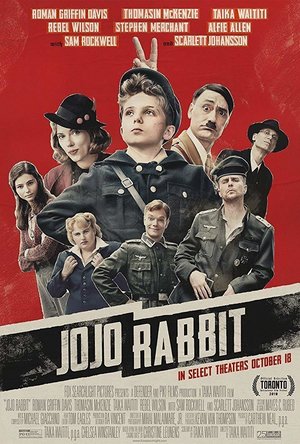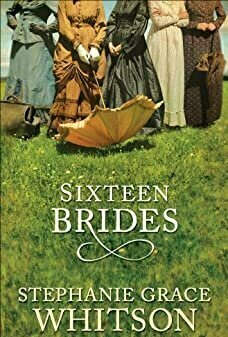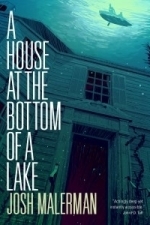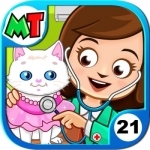
My Town : Pets
Games and Education
App
*** Pay once & Play forever + receive FREE updates! No ads and no IAP *** If you have a pet or are...
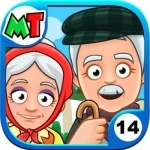
My Town : Grandparents
Education and Games
App
It’s always a fun day when you get to visit your My Town grandparents! How fun to check out where...
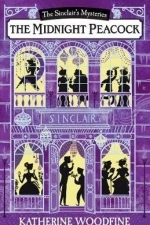
The Midnight Peacock: The Sinclair's Mysteries
Book
A fast-paced historical mystery adventure for readers aged 9+ years, with gorgeous Edwardian period...
young adult crime
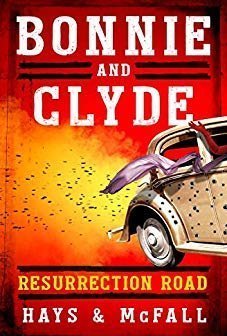
Bonnie and Clyde: Resurrection Road
Clark Hays and Kathleen McFall
Book
THE RETURN OF BONNIE AND CLYDE Saving democracy, one bank robbery at a time. In the provocative...
series adult fiction Bonnie & Clyde Bonnie and Clyde
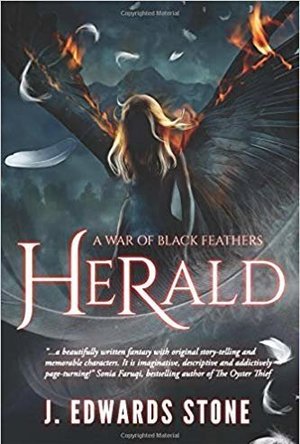
Herald
Book
Eighteen-year-old Larin Thompson was a product of abuse and neglect, thinking her life couldn’t...
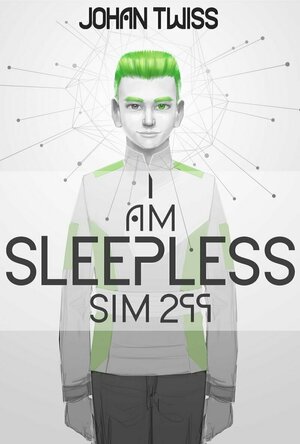
Sim 299 (I Am Sleepless #1)
Book
The planet Ethos is at war with a savage enemy known as the Splicers. Their only successful defense...
Young Adult Science Fiction Dystopian Mystery
Chris Sawin (602 KP) rated Jojo Rabbit (2019) in Movies
Oct 8, 2019
Based on the 2008 novel Caging Skies by Christine Leunens, Jojo Rabbit is a bonkers twist on one of the most devastating wars and tyrannical madmen in history. On the surface, the film is about a child attempting to become a Nazi because he views HItler as this great leader. He has to attempt to learn to kill, hate Jews, and essentially ignore all of his morals in order to just fit in with an army who believes they are the superior race. The intriguing aspect is that Waititi injects this unexpected tenderness and has concocted a film that has a heartbeat that is entirely too human and too genuine for any sort of project involving the likes of Adolf Hitler.
The Jojo/Hitler dynamic is an incredibly playful one. Hitler only seems to show up when something doesn’t go according to plan for Jojo or he needs some words of encouragement when times get tough. Hitler is a figment of Jojo’s imagination and is completely reactionary to Jojo’s world. If Jojo gets scared, Hitler shows up to remind him why he’s risking his own self comfort. While Waititi is funny and awkwardly charming as Hitler, which is an odd thing to say in itself, don’t overlook Archie Yates. Roman Griffin Davis encapsulates this innocence that even Elsa describes as something along the lines of a ten year old playing dress up with his friends in order to join a club. But Yates often plays off of Davis humorously and amusingly and will likely be forgotten about by some by the time they leave the theater.
Seemingly tapping into his inspiration for Gentlemen Broncos, Sam Rockwell portrays Captain Klenzendorf - a former war veteran who lost an eye and is now forced to teach children how to be soldiers. He has this strange tension on the verge of romance thing going on with his right hand man Finkel (Alfie Allen) and has extravagant taste with intricate ideas for his new uniform. Rockwell and Allen are hilarious and outshine Rebel Wilson’s Fräulein Rahm who never seems to serve much purpose before or after her line about, “having 18 kids for Germany.”
The sweet nature of Jojo Rabbit is expanded upon with the mother/son relationship between Rosie and Jojo. They have completely different viewpoints of a world on the verge of total annihilation where Jojo is slowly nudged into his mother’s mindset. It’s not so much a brainwashing as it is Jojo coming to terms with how he feels about people. Jojo Rabbit defines who we all are on the inside and simply explores the path anyone with an everyday beating heart (not rooted by a tiny mustache) would travel down over the course of their youth.
It’s kind of extraordinary that Jojo Rabbit has been released during a time when Fox Searchlight Pictures is owned by Walt Disney Studios Motion Pictures where a guy directing two of the biggest Thor movies did a side project where he plays Hitler and never had to attempt to keep that a secret. Waititi puts Jojo Betzler through the ringer by blowing him up repeatedly and throwing him down a flight of stairs all while being bullied and pushed around the entire time. But dammit if Jojo Rabbit isn’t one of the most heartfelt and imaginative fairy tales of the year.
This is a film where storytelling, embellishing and elongating false reputations, and glorifying urban myths is the driving force of entertainment. Underneath its layers of SS uniforms, dangerous pistols, and knives you should never leave home without, Jojo Rabbit is a touching film about human compassion with an intimacy that is absolutely unparalleled. Categorized somewhere between Wes Anderson’s Moonrise Kingdom and an imaginative concept that is an obvious homage to Calvin and Hobbes, love feels like it’s the only thing spreading across the world more powerful than war and Jojo Rabbit is more than happy to hype you up and throw you in love’s way without remorse.
Rachel King (13 KP) rated Keridan's Journey in Books
Feb 11, 2019
There are so many examples of bad grammar in this book, I don't know where to begin. Commas are so lacking, I want to cry. Specifically, when using prepositions or preposition-like modifiers, commas are needed. Also, compound sentences require the use of a comma. You would be surprised at how much a simple comma allows the reader to garner the true meaning of a sentence. Another example that illustrates how badly this book needed an editor is found on page 86: "I was left to wonder wear my tough skin went." Yes, you read that correctly.
Another huge problem I had with the book is the author's complete disregard for the writer's tool of "show, don't tell." While I understand that sometimes the rule can be disregarded, this book lacks in "showing" so much that I have no connection to any of the characters, and none of the events transpiring can compel any interest or emotional response in me. For example, on page 13, Keridan is thrust into a dream to speak with her mother. It reads "The smells, the colors are only this vibrant in a dream." That's it. No description, no picture painted with words, nothing is detailed, except in the most basic of words, such as "forest grove with flowers", "fairy dress", etc. I don't know what any of the characters look like, nor can I tell the difference between any of them.
I usually love fantasy, especially because of the imaginative descriptions that defy reality and convention, but (see? Comma!) even with a great concept of using the Greek myths of Sirens to build a world, this book is too disappointing and frustrating to be worth my time and energy. In all honesty, this book reads like a first draft of a novel after NanoWrimo -- messy, disorderly, and badly in need of a rewrite.
Rachel King (13 KP) rated Sixteen Brides in Books
Feb 11, 2019
Luckily, that number was cut by more than half when the train stops in Plum Grove, Nebraska, leaving behind the important characters and sending the expendible ones away - how convenient. This is where I feel that the plot actually begins, as the women carve out lives for themselves, even as they experience character growth and rejuvenation. The men are also introduced at this point, and I found them to be more imaginative and unique than the females in the book. The dynamics between Michael Ransom and Lucas Gray, cousins, are very interesting, as Whitson only reveals a bit at a time about their relationship with each other. I wished that more had been written about Jeb Cooper, as the paradox that he lives daily was very entertaining to read.
The background information and historical details were interesting, as I knew little before reading this book about frontier towns and the founding and running of a homestead. I find it ironic that although all of the women are strongly opposed to being hitched to a man again, given that they all claim to be widows, romance seems to be necessary to each of their character developments. The romance was the most predictable aspect of the novel, with almost every woman gravitating noticeably to a man.
The idea that war widows were shipped out to the frontier as prospective brides made for excellent novel potential, but I felt the idea fell a bit short, as the man responsible in the book for these sixteen women was not followed in point-of-view passed his departure from Plum Grove. Neither was much said about the other women that went on to Cayote with him. I would have liked to be a fly on the wall at those women's proposals from strangers and hear their rationale behind making such a choice to be delivered and bid on like so many heads of cattle.
Acanthea Grimscythe (300 KP) rated A House at the Bottom of a Lake in Books
Jan 31, 2019
A House at the Bottom of a Lake is a coming of age story, one of those ones where the reader experiences the final moments of the main characters’ innocence. The house itself symbolizes the imaginative youthfulness and innocence of the more childlike mind, while the canoe represents the path to adulthood and the obstacles that must be overcome. Just like life experiences change us, the events leading up to the conclusion of the story change the canoe in ways that cannot be undone: paint chipping, dents, scratches, etc. I’d provide another example to support this theory, but that would, unfortunately, mean giving away a major spoiler to the story–so I won’t.
As far as the characters go, I found Amelia and James to be your stereotypical awkward teenagers. There is a bit of a disconnect between their age and their assumed behavior, leaning to the idea that these two kids are well-behaved and normally aren’t risk takers. Because of this, there are several moments where the story is dull.
There’s no doubt that this is a piece of work by Josh Malerman; it has his style all over it. That is, it’s meant to be suspenseful. However, the manner in which Malerman writes A House on the Bottom of a Lake struck me as a bit more jarring than edge-of-your-seat, ohmigawd what is happening!? This is probably because Malerman is a little too friendly with the parentheses in this book.
A House on the Bottom of a Lake is a great one-time read. It’s enjoyable and it has its moments, and the bond shared between Amelia and James feels realistic. It’s definitely something I’d recommend to a Malerman fan, though it isn’t worthy of a pedestal of its own.
